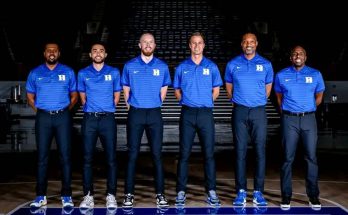The buildup to a season-opening showdown between Ohio State and Texas has already been filled with hype, tension, and national attention, but one storyline that emerged days before kickoff had nothing to do with players, coaches, or even the actual game plan. Reports circulated online that Ohio State had banned Barstool Sports founder and outspoken Michigan alum Dave Portnoy from attending the highly anticipated matchup at Ohio Stadium. The story spread quickly, especially given Portnoy’s polarizing persona and his long-standing ties to Michigan football, but the university was quick to respond and deny the notion that Portnoy or anyone else had been “banned” from the game. What followed was a flurry of conversation that reflected not just on Ohio State’s football culture but also on how sports media and personalities increasingly intersect with the college game.
For Ohio State, the suggestion that it had barred someone from attending the season opener against Texas was not a small matter. The Buckeyes are a program known for tradition, prestige, and massive fan interest, and the image of excluding a media figure—even one as controversial as Portnoy—was immediately interpreted as a potential misstep. Fans and commentators alike jumped on the claim, with some suggesting Ohio State was attempting to control its brand image too tightly and others speculating that the move was motivated by Portnoy’s Michigan ties. The fact that the opponent was Texas, a team ranked near the top of the national polls and seen as a legitimate College Football Playoff contender, only amplified the noise. This wasn’t just any early-season game—it was one with national implications, and so the drama surrounding who could or couldn’t enter the stadium naturally added another layer of intrigue.
Dave Portnoy himself has never shied away from controversy or from clashing with institutions. Known as “El Presidente” to his loyal Barstool fanbase, Portnoy has long blended sports, pop culture, and unapologetic opinion into his media empire. As a Michigan alum, he has often taken direct shots at Ohio State, leaning into one of the most storied rivalries in college sports. That background gave the rumors of a ban additional weight, since many Ohio State fans were quick to believe their university might want to avoid Portnoy bringing his Michigan-leaning antics to such a high-profile stage. However, according to the official word from the school, there was no truth to the ban reports. A spokesperson clarified that Ohio State had not blocked Portnoy from attending and that tickets are sold and distributed in a way that doesn’t allow for such a targeted exclusion.
The denial, though, hasn’t stopped the conversation. The idea that Portnoy was initially “banned” played perfectly into the current sports media environment, where personalities often become part of the show themselves. Whether or not Portnoy is actually present at Ohio Stadium on Saturday, his name is now tied to the game. His critics argue that this is exactly what he wanted: to insert himself into the narrative of a major college football event. His supporters, meanwhile, believe that the quick denial from Ohio State shows how sensitive the university is to negative press and how much influence a figure like Portnoy can wield with just a few tweets or statements.
The truth may be less sensational than the headlines, but it underscores a deeper reality about college sports today. The game is no longer just about the players on the field—it’s also about the broader ecosystem of media voices, fan bases, and brand control. Ohio State, one of the largest and most powerful athletic departments in the country, is constantly balancing its identity as a tradition-rich program with the modern realities of being in the spotlight 24/7. The mere suggestion that it would keep out someone like Portnoy reveals how much scrutiny the school is under, especially when it comes to high-profile matchups.
The timing of the story was also crucial. Ohio State’s game against Texas is more than a regular-season contest; it’s a litmus test for Ryan Day’s program and a chance to make a statement on the national stage. Texas enters the year with lofty expectations, bolstered by high-level recruiting and strong returning talent. Ohio State, meanwhile, has its own aspirations of winning the Big Ten and returning to the College Football Playoff. In this context, the Portnoy saga becomes a sideshow, yet one that still captures attention because of how much college football is as much about the spectacle as it is about the sport itself. Fans waiting for kickoff consume every storyline, and the idea of Portnoy being banned provided another talking point in the lead-up.
It is also worth noting that Portnoy has a history of being denied access to major events. The NFL once barred him from attending Super Bowl media days due to his stunts and protests, and other leagues have clashed with him over credentialing. This history likely added fuel to the fire in the Ohio State situation, as many assumed the Buckeyes might simply be following in the footsteps of other organizations wary of his antics. But unlike a credentialed media situation, college football stadiums operate on ticket sales, meaning unless someone is trespassing or violating security measures, attendance is generally open. That makes the idea of a ban far less practical and, as Ohio State clarified, untrue.
Still, even without an official ban, the storyline benefits Portnoy. As a master of turning controversy into publicity, he thrives on narratives that paint him as the outsider taking on powerful institutions. By being linked to Ohio State’s biggest non-conference game of the season, he gains relevance with both his Barstool audience and the broader sports world. Some Ohio State fans view this as exactly the problem—Portnoy finding ways to inject himself into Buckeye storylines. But others shrug it off as part of the modern college football landscape, where media noise is inseparable from the actual sport.
For Ohio State, the main concern will always be ensuring that the focus remains on the team. Ryan Day has spent the offseason preparing his squad for a run at the national championship, and Texas presents a formidable first test. The Buckeyes will rely on their defense, their depth at the skill positions, and their home-field advantage at Ohio Stadium, which will be packed with more than 100,000 fans. Whether Dave Portnoy is in one of those seats or not ultimately makes little difference to the outcome, but the narrative serves as a reminder of how much attention college football commands. Every detail—who’s in the crowd, what signs fans are holding, what personalities are stirring up discussion online—becomes part of the broader experience.
There’s also the rivalry factor to consider. The Ohio State-Michigan rivalry is one of the fiercest in sports, and Portnoy’s Michigan allegiance means he will never be a neutral figure in Columbus. For Buckeye fans, his presence could be seen as provocation, while for Michigan fans it might serve as entertainment. That layer of rivalry undoubtedly contributed to the speed with which the “ban” story spread. Even outside the Ohio State-Texas game, the specter of Michigan is always looming, especially after the Wolverines’ recent success under Jim Harbaugh. For Ohio State, anything connected to Michigan carries extra weight, and Portnoy, willingly or not, embodies that connection.
As the dust settles, the denial from Ohio State likely closes the official chapter of this mini-controversy, but the conversation it sparked illustrates the environment surrounding college football in 2025. The sport thrives not just on what happens on Saturdays but also on the stories, debates, and personalities that orbit around it. For Ohio State, the message is clear: they did not ban anyone, and they want the focus on the showdown with Texas. For Portnoy, the outcome is just as clear: his name is now part of that narrative, giving him and Barstool more visibility during one of the most-watched games of the early season.
In the end, the situation is emblematic of how perception and reality can blur in the sports world. A rumor can spread, get picked up, and create a wave of discussion before the facts catch up. Ohio State’s quick response demonstrates an awareness of how important it is to control the message, especially heading into a high-profile matchup. Fans, players, and coaches alike will turn their full attention to the field when the Buckeyes and Longhorns finally face off, but the Portnoy episode will linger as a small reminder of the spectacle that surrounds these games.
As kickoff approaches, Ohio State finds itself in a position that is familiar but still daunting—needing to prove its place among the nation’s elite while managing the noise that comes with being one of the sport’s biggest brands. Texas will bring its own energy and determination, making the game a clash that could shape the playoff conversation months down the line. And somewhere in the mix, whether physically present in Ohio Stadium or simply active online, Dave Portnoy will be part of the conversation. It’s a testament to how college football has evolved into something larger than just the sport itself. The storylines extend beyond the gridiron, and the spectacle includes everyone from coaches and players to fans and media personalities.
Ultimately, the denial of a ban may seem like a small footnote in the grander scope of college football, but it also illustrates the intersection of sports, media, and culture in the modern era. Ohio State and Texas will battle under the lights in Columbus, and the eyes of the nation will be on the game itself. Yet, in the buildup, even a rumor about Dave Portnoy was enough to command headlines, stir debate, and remind us that college football is as much about the stories off the field as the ones on it. For Ohio State, the objective remains clear: win the game, send a message, and keep the focus where it belongs. For Portnoy, the outcome is also clear: whether banned or not, he has once again placed himself at the center of the conversation, and in his world, that is always a win.



